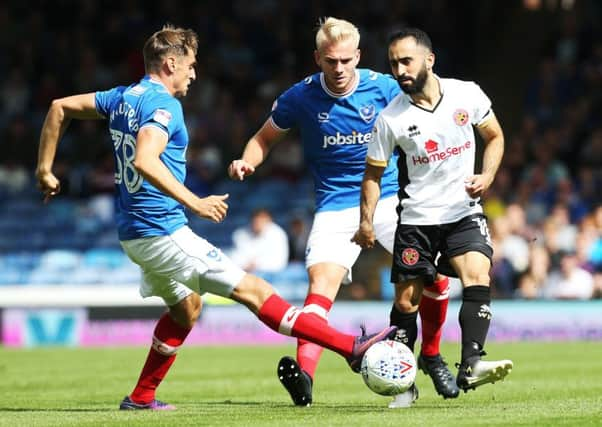Is there hope for Pompey in broken youth system?


The next time the striker pulls on a royal blue shirt it will no doubt be a proud moment for the young striker and his family.
It will also be an occasion to savour for the academy and coaches who nurtured the home-grown talent into the bright product he is.
Advertisement
Hide AdAdvertisement
Hide AdBut how much longer can the Blues continue fending off the vultures who continue to circle for the next Chaplin?
Yes, there is quite rightly a sense of pride at the conveyor belt of players being fed into the senior set-up.
It may be well established but the list is still worth underlining: For Chaplin, read Jack Whatmough, Alex Bass, Adam May, Brandon Haunstrup and Ben Close in the current squad.
And, of course, there are the likes of Joel Ward, Gary O’Neil, Adam Webster and Matt Ritchie who have graduated and gone on to success elsewhere in recent years.
Advertisement
Hide AdAdvertisement
Hide AdThe game now, however, is witnessing a growing and, for many, disconcerting pattern beginning to emerge.
Last week, Huddersfield effectively announced they are scrapping their academy after bringing one player through to play top-flight football in 18 years.
That follows on from Brentford shutting down their academy just over a year ago, in favour of focusing on a development squad of players aged between 17 and 20.
What does that say about the way football’s headed when such decisions become the prudent economic move for such clubs to make?
Advertisement
Hide AdAdvertisement
Hide AdThe logic of the words from Bees’ head of football operations Robert Rowan regarding their change should act as chilling warning over a system with obvious flaws.
‘We were spending £2m a year on something that simply wasn’t producing enough players for the first team,’ Rowan said, in The Sun this week.
‘If you went on Dragon’s Den and pitched a business plan that was going to spend more than £2m a year and said: “Give me 10 years and hopefully we’ll produce one or two players who will give you most likely less than that £20m”, they would say it was a pretty bizarre model.’
Pompey are currently a Category Three academy. For all the promise in investment in youth under Michael Eisner, those words probably underline why progressing to Category Two is still a way off.
Advertisement
Hide AdAdvertisement
Hide AdThe talk is the Blues’ focus will lie on introducing a similar squad to Brentford’s to work in tandem with the existing set-up.
Jackett places huge stock in having the eyes on the ground to pick up the players cast aside by the game’s big boys.
Hence a revamped scouting set-up which saw Phil Boardman’s arrival announced as head of recruitment confirmed last week.
He will be assisted by Ashley Gilligan and Keith Miller on a part-time basis.
Advertisement
Hide AdAdvertisement
Hide AdMuch has been made of Jackett’s contacts in and around the capital and, speaking to the Pompey boss, it’s clear he places fundamental importance on picking up the rough diamonds .
You get the feeling the 55-year-old’s standards of professionalism extend to not accepting excuses for any players who fit Pompey’s profile falling through the prospector’s sieve.
Jackett has voiced interest in the way Brentford have dealt with the problems they’ve encountered with developing talent.
No-one should interpret that as a desire to implement a similar revolution at the Blues’ Roko training base, though.
Advertisement
Hide AdAdvertisement
Hide Ad‘When you look at a youth policy, you look at how much it’s cost and what you’ve brought through say over a five or 10-year period,’ said Jackett on the topic.
‘Brentford’s an interesting model where they’ve scrapped from 18s down and ran a development group.
‘I wouldn’t suggest that because what is right for west London may not be right here.
‘The good thing about running a youth policy is you can bring someone in.
Advertisement
Hide AdAdvertisement
Hide Ad‘If you have an existing under-18 and under-21 group and you see a couple at 18 or 19 from Ireland, you can bring them in.
‘You can’t say it’s your youth policy but you can give them a two-year contract and they can play and train somewhere.’
It’s the freedom the big boys now have to move in on another club’s turf and cherry pick young talent, which has everything to do with what’s taking place at Huddersfield and Brentford.
Training compensation is afforded sides when their best players are nabbed by the Chelseas, Arsenals and Uniteds. But the figures are small beer in today’s game.
Of course, inducements to parents are a no-go.
Advertisement
Hide AdAdvertisement
Hide AdBut that hasn’t stopped Manchester City and Liverpool being hit with bans for ‘tapping up’ youngsters in 2017.
In recent years we’ve seen Reading’s John Swift and one of the game’s hottest young properties, Mason Mount, spirited away from the Blues’ patch into Chelsea’s academy.
Pompey have been compensated for England under-17 midfielder Jack Nolan going to Reading. Brighton have taken other young talents in the club’s system.
‘It’s a much-talked about problem,’ admitted Jackett.
‘If you run a youth policy but your top two or three go it makes it difficult.
‘It’s training costs they go for which is not that much.
Advertisement
Hide AdAdvertisement
Hide Ad‘If you compare that to first-team level it’s really not a lot. Minimal.
‘The one from Portsmouth is Mason Mount. It’s hard to keep them, though, when Chelsea come calling.
‘It’s quite difficult. But there’s a lot of lads like Haunstrup, Whatmough, May, Bass and Chaplin who’ve played.’
Pompey’s weaponry against the Category One rivals surrounding them geographically is their continued standing in the game.
A stated policy of giving the kids a chance, with increasing evidence to substantiate the claim, is their best defence to fight off the enemy.
It gives them hope in a broken system.